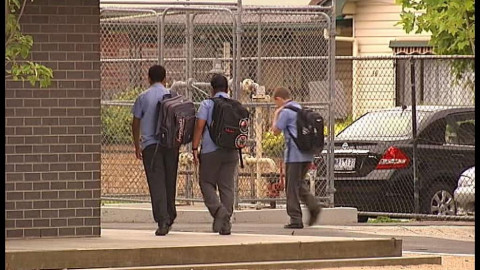
Hamish Fitzsimmons
A leading expert on autism is warning of the long-term costs if funds to assist the education of children with autism spectrum disorder continue to be cut.
Transcript
TONY JONES, PRESENTER: A leading autism expert is warning that state funding cuts will cause long-term damage to children with autism spectrum disorder. Around the country, funding for high functioning autistic children is under review. Thousands of families are affected as children are forced from special schools into mainstream schools.
Hamish Fitzsimmons reports and the producer was Candice Talberg.
HAMISH FITZSIMMONS, REPORTER: For children on the autism spectrum, even a specialist school can be a difficult place. Now many parents are faced with putting their kids into mainstream school for the first time, with governments changing funding arrangements so there are fewer places at specialist schools.
ADAM DAVIS, PARENT: Everyone's just saying that he'll really struggle. I mean, the words that he'll flounder - go backwards.
TONY ATTWOOD, AUTISM EXPERT: Now, with autism it's not just in learning abilities, it's socialising, managing their emotions, coping with a sensory sensitivity, which means that for many children with autism, a typical classroom is hell.
HAMISH FITZSIMMONS: Victoria's testing for special needs assistance includes a language exam which often results in autistic children strong language skills being told they should attend mainstream schools with no additional support. The parents of 11-year-old Ethan Davis were told he will be going to a local high school after attending a specialist school.
ADAM DAVIS: Ethan was reassessed in May of this year and, yeah, his IQ has come up too high and basically we're being told that we have to find a mainstream school for Ethan. And this is I guess goes against the advice that we're receiving from Ethan's psychologist, his paediatrician, GP and even some of the staff within the school.
HAMISH FITZSIMMONS: Janaene Baker was also told her son William must go to a mainstream high school.
JANEANE BAKER, PARENT: I didn't even know there was a mandatory funding review at Year Six. As far as I was concerned, William's in the equivalent of year six at his school and next year he'd be going into the equivalent of year seven.
HAMISH FITZSIMMONS: There's a concern that cutting special needs funding is a short-term saving.
TONY ATTWOOD: In the long term there are going to be major problems in terms of that person, shall we say, not having the support, that training that they're going to need to be independent adults. So in others words they're going to be on a pension rather than a taxpayer.
HAMISH FITZSIMMONS: It's not just happening in Victoria. In May, the NSW Government cut funding for disability support in 272 schools. New money has been provided by the Federal Government, but students aren't getting the support they need and parents say other children will also be affected.
JANEANE BAKER: It could be five minutes, it could be 50 minutes, where the elevation can get to a level where he does become violent, hides under tables screaming, that sort of thing, and the children would miss out on being instructed. It's as simple as that.
ADAM DAVIS: I think that our - you know, our teachers have got a hard enough job as it is. There's no doubt that Ethan's going to take extra time away from that teacher which is going to affect the other kids in the classes.
HAMISH FITZSIMMONS: The mainstream schools that Ethan and William are due to attend are like MPST and aren't capable of supporting autistic students without qualified teacher's aide, according to leading autism expert Tony Attwood.
TONY ATTWOOD: Often what happens is the education authority will say, "Well, we'll give you a teacher aide." But it's nowhere near enough in time and they're not trained enough. And this is not fair on the child, their families who've got to suffer the consequences of that child who doesn't want to go to the school, but it's not fair on the teacher and it's not fair on the other children.
HAMISH FITZSIMMONS: Parents of autistic spectrum kids fear because their children are different, they'll suffer socially. A recent study by Bond University found 80 per cent of children with forms of autism were bullied at school.
TONY ATTWOOD: Kids can either be very maternal or predatory in every class. There will be predators and this is an area that I find as a clinician: I'm having to deal with the effects of bullying and teasing that happened 20 or 30 years ago for adults who are still traumatised by what happened.
HAMISH FITZSIMMONS: Janaene Baker has been through the trauma of watching William struggle socially, such as when they tried to involve him in Scouts.
JANEANE BAKER: They were playing a game where they had to have two teams and the team leader, trying to be inclusive of William, made him one of the team leaders and said to the other kids, "Line up behind a team leader," and nobody lined up behind William. And he just looked and said, "Why isn't there anybody on my team?"
HAMISH FITZSIMMONS: Adam Davis faces a similar predicament with Ethan.
ADAM DAVIS: The only way we may get funding is for Ethan to get to the point where he's that anxious that he becomes extremely withdrawn, might have trouble sleeping, you know, and other health difficulties, and we've never needed to medicate Ethan, but we're being told that is - well, quite possibly be the case.
HAMISH FITZSIMMONS: Janaene Baker knows what she'll do if William is forced into mainstream high school.
JANEANE BAKER: If he doesn't get funding, I won't be sending him to a mainstream school. I won't be doing it. I'll be keeping him at home. He would never, ever survive.
HAMISH FITZSIMMONS: Hamish Fitzsimmons, Lateline.